Meaning
– the reflection of an object, phenomenon, relations in a l-ge.
Types of meaning: 1) lexical (the reflection of a concept in a word
form – goes, went); 2) grammatical ( the reflection of the
relations of obj. in
the
forms of the word – asked, walked); 3) functional (classifies
words, parts of speech – export (n) & export (v). Lexical
meaning: 1) denotational (objective) – the ability of a word to
refer to an individual object; 2) significative (notional, identical)
– the ability of a word to generalize significant properties of
objects & to present them as abstract ideas); 3) connotational
(pragmatic) – the ability of a word to evoke & directly express
emotions; 4) conceptional – scientific meaning. Motivation – a
direct connection between the structure of the word & its
meaning. Types: 1) morphological (re-think – think again); 2) sound
symbolism (sounds associated with words: buzz – жужжать,
cuckoo – куковать); 3) semantic (based on metaphoric
transfer – heart-breaking, eye-wash – надувательство).
5. Change of meaning in English.
Word-meaning
is liable to change in the course of the historical development of
language. Causes
of Semantic Change
-
extra-linguistic
— various
changes in the life of the speech community, changes in economic and
social structure, changes in ideas, scientific concepts, way of life
and other spheres of human activities as reflected in word meanings -
linguistic
—.
factors acting within the language system
-
ellipsis
(In
a phrase made up of two words one of these is omitted and its
meaning is transferred to its partner. The verb to
starve, e.g.,
in Old English had the meaning ‘to die’ and was habitually used
in collocation with the word hunger.
Already
in the 16th century the verb itself acquired the meaning ‘to die
) -
differentiation
of synonyms
(The
word land,
e.g.,
in Old English (OE. land)
meant
both ’solid part of earth’s surface’ and ‘the territory of
a nation’. When in the Middle English period the word country
(OFr.
contree)
was
borrowed as its synonym, the meaning of the word land
was
somewhat altered and ‘the territory of a
nation’
came to be denoted mainly by the borrowed word country) -
linguistic
analogy
— if one of the members of a synonymic set acquires a new meaning
other members of this set change their meanings too. (e.g.,
all English adverbs which acquired the meaning ‘rapidly’ always
develop the meaning ‘immediately’, similarly verbs synonymous
with catch,
e.g. grasp, get, etc.,
by semantic extension acquired another meaning —
‘to
understand’)Nature
of Semantic Change
Generally
speaking, a necessary condition of any semantic change, no matter
what its cause, is some connection, some association between the old
meaning and the new. There are two kinds of association involved as a
rule in various semantic changes namely:
-
Similarity
of meanings or metaphor — a semantic process of associating two
referents, one of which in some way resembles the other.
The word hand,
e.g.,
acquired in the 16th century the meaning of ‘a pointer of a clock
of a watch’ because of the similarity of one of the functions
performed by the hand (to point at something) and the function of
the clockpointer. -
Contiguity
of meanings or metonymy — the semantic process of associating two
referents one of which makes part of the other or is closely
connected with it. (the
word tongue
— ‘the
organ of speech’ in the meaning of ‘language’ (as in mother
tongue; cf.
also L. lingua,
Russ.
язык).
The
word bench
acquired
the meaning ‘judges, magistrates’ because it was on the bench
that
the judges used to sit in law courts, similarly the
House acquired
the meaning of ‘members of the House’ (Parliament)).
Results
of semantic change
can be generally observed in the changes of the denotational meaning
of the word (restriction and extension of meaning) or in the
alteration of its connotational component (amelioration and
deterioration of meaning).Changes
in the denotational meaning
-
restriction
of
the types or range of referents denoted by the word (the
word hound
(OE. hund) which
used to denote ‘a dog of any breed’ but now denotes only ‘a
dog used in the chase’)
-
specialisation
of meaning — if the word with the new meaning comes to be used in
the specialised vocabulary of some limited group within the speech
community it is usual to speak of
(the verb to
glide (OE. glidan) which
had the meaning ‘to move gently and smoothly’ and has now
acquired a restricted and specialised meaning ‘to fly with no
engine’ (cf. a
glider))
-
extension
of meaning—application of the word to a wider variety of
referents.
(the word target
which
originally meant ‘a small round shield’ (a diminutive of targe,
сf.
ON. targa) but
now means ‘anything that is fired at’ and also figuratively ‘any
result aimed at’)
-
generalisation
of
meaning —
the word with the extended meaning passes from the specialised
vocabulary into common use
(The
word camp, which originally was used only as a military term and
meant ‘the place where troops are lodged in tents’ extended and
generalised its meaning and now denotes ‘temporary quarters’ (of
travellers, nomads, etc.)
Changes
in the connotational meaning:
-
pejorativedevelopment
— acquisition by the word of some derogatory emotive charge (the
word boor
was
originally used to denote ‘a villager, a peasant’ and then
acquired a derogatory, contemptuous connotational meaning and came
to denote ‘a clumsy or ill-bred fellow’) -
ameliorative
development — improvement of the connotational component of
meaning.. (the
word minister
which
in one of its meanings originally denoted ‘a servant, an
attendant’, but now —
‘a
civil servant of higher rank, a person administering a department of
state or accredited by one state to another’)
Соседние файлы в предмете [НЕСОРТИРОВАННОЕ]
- #
- #
- #
- #
- #
- #
- #
- #
- #
- #
- #
- Размер: 250 Кб
- Количество слайдов: 17
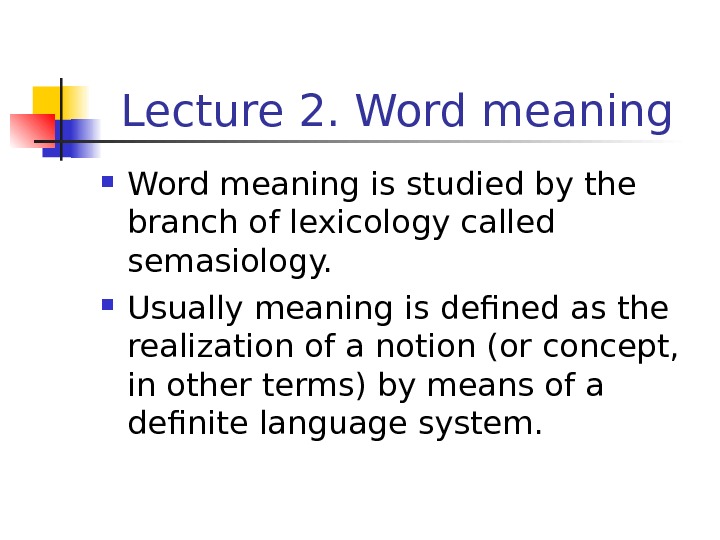
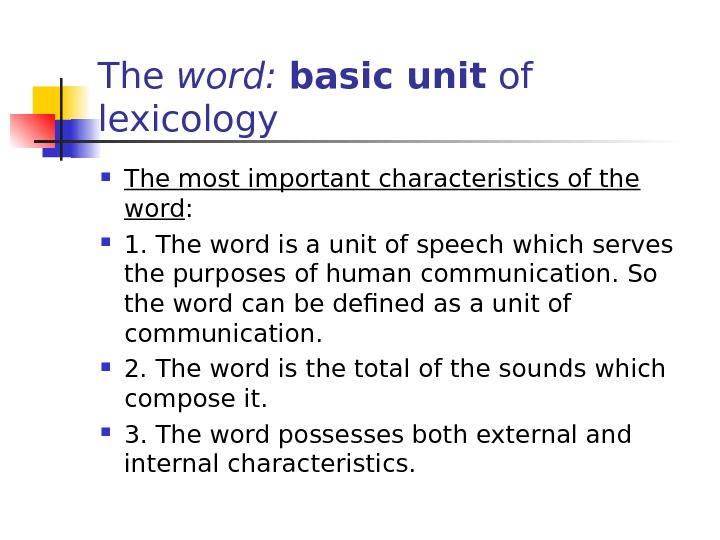
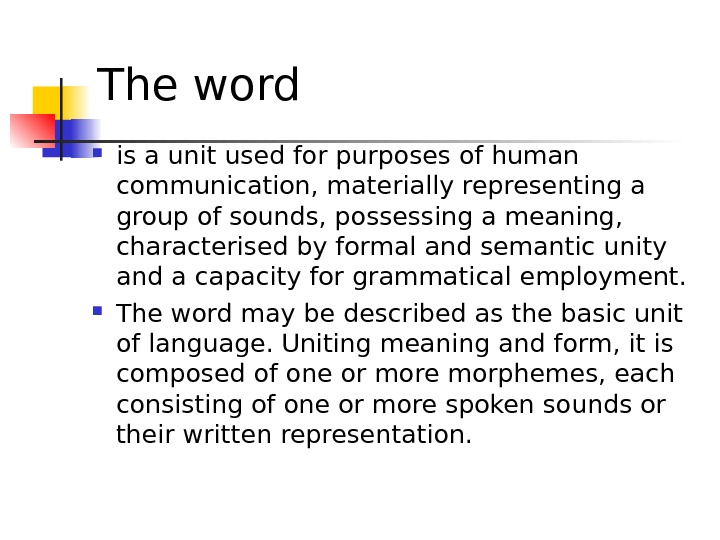
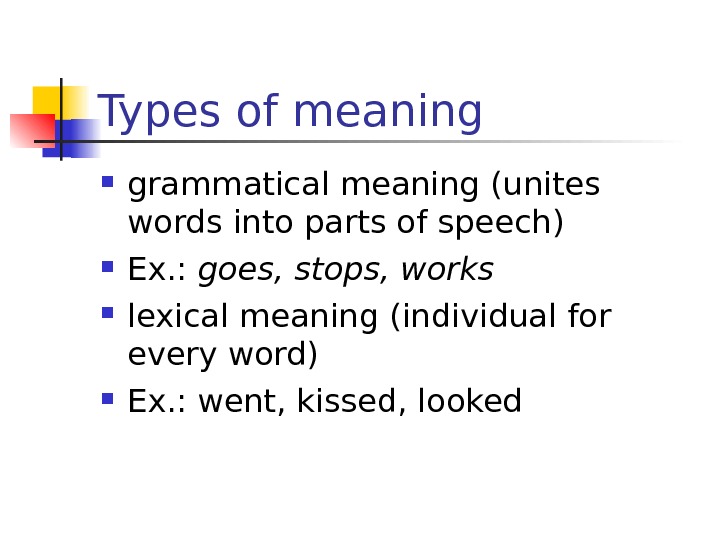
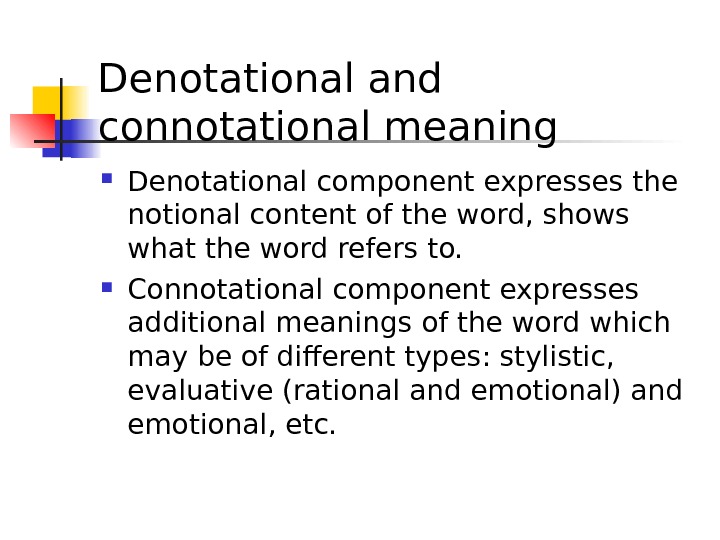


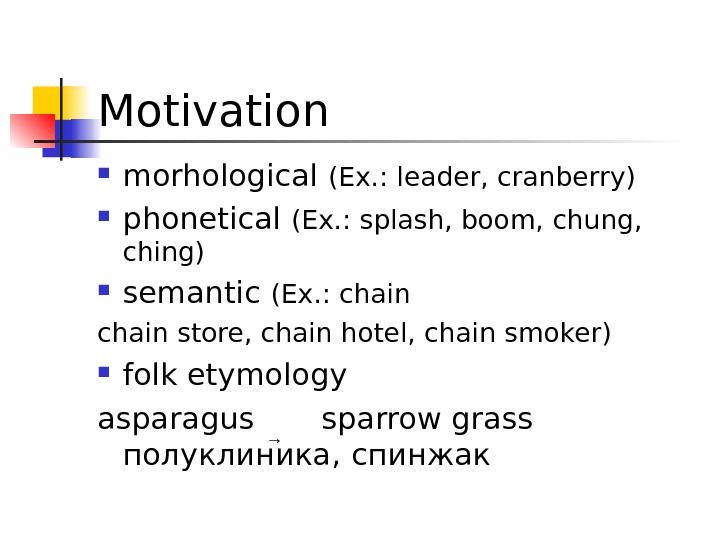

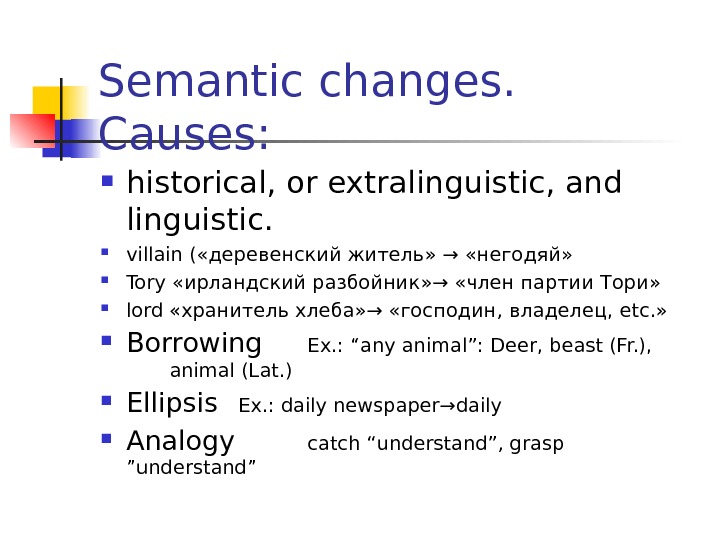
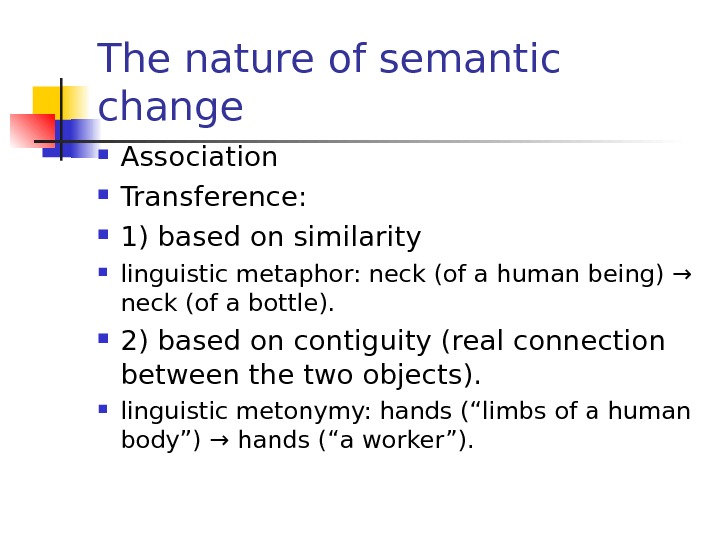
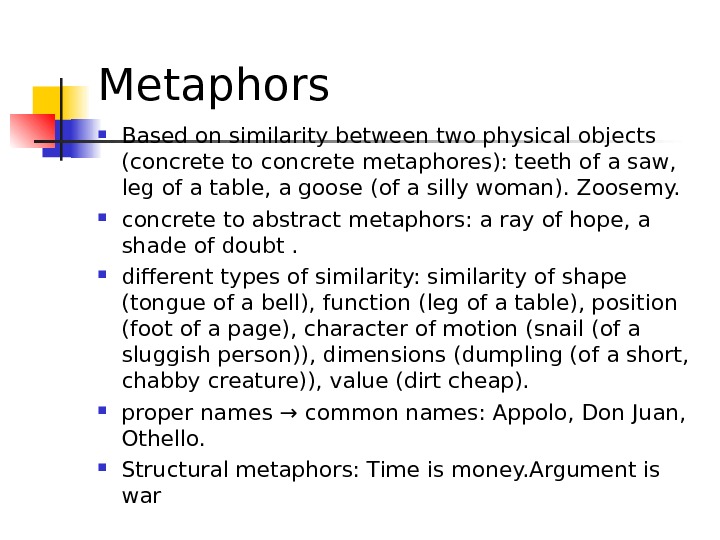



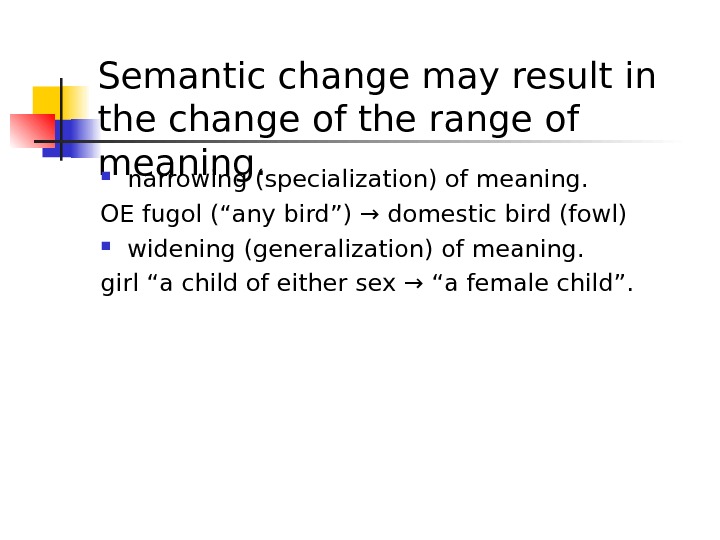
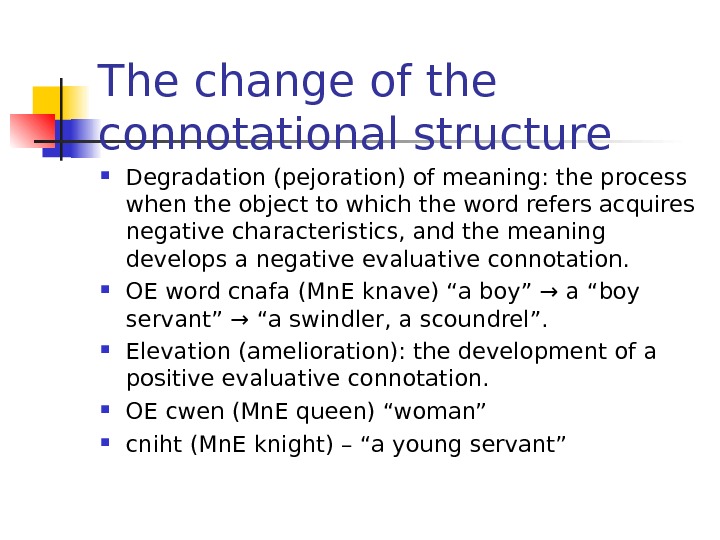
Look up meaning in Wiktionary, the free dictionary.
Meaning most commonly refers to:
- Meaning (linguistics), meaning which is communicated through the use of language
- Meaning (philosophy), definition, elements, and types of meaning discussed in philosophy
- Meaning (non-linguistic), a general term of art to capture senses of the word «meaning», independent from its linguistic uses
- The meaning of life, the significance, purpose, or worth of human existence
Meaning may also refer to:
- Meaning (psychology), epistemological position, in psychology as well as philosophy, linguistics, semiotics and sociology
- Meaning (semiotics), the distribution of signs in sign relations
- Meaning (existential), the meaning of life in contemporary existentialism
Arts and entertainmentEdit
- Meanings (album), a 2004 album by Gad Elbaz
- «Meaning» (House), a 2006 episode of the TV series House
- Meaning (music), the philosophical question of meaning in relation to music
- «The Meaning», a song on Discipline (Janet Jackson album) (2008)
- The Meaning (album), a 2011 album by Layzie Bone
See alsoEdit
Wikiquote has quotations related to Meaning.
- Hermeneutics, the theory of text interpretation
- Linguistics, the scientific study of language
- Logotherapy, psychotherapy based on an existential analysis
- Meant to Be (disambiguation)
- Notion (disambiguation)
- Proposition (disambiguation)
- Semantics, the study of meaning
- Significance (disambiguation)
- All pages with titles containing Meaning
- Top Definitions
- Synonyms
- Quiz
- Related Content
- Examples
- British
This shows grade level based on the word’s complexity.
This shows grade level based on the word’s complexity.
noun
what is intended to be, or actually is, expressed or indicated; signification; import: the three meanings of a word.
the end, purpose, or significance of something: What is the meaning of life? What is the meaning of this intrusion?
Linguistics.
- the nonlinguistic cultural correlate, reference, or denotation of a linguistic form; expression.
- linguistic content (opposed to expression).
adjective
intentioned (usually used in combination): She’s a well-meaning person.
full of significance; expressive: a meaning look.
QUIZ
CAN YOU ANSWER THESE COMMON GRAMMAR DEBATES?
There are grammar debates that never die; and the ones highlighted in the questions in this quiz are sure to rile everyone up once again. Do you know how to answer the questions that cause some of the greatest grammar debates?
Which sentence is correct?
Origin of meaning
First recorded in 1350–1400; Middle English (noun); see mean1, -ing1, -ing2
synonym study for meaning
1. Meaning, purport, sense, significance denote that which is expressed or indicated by something. Meaning is the general word denoting that which is intended to be or actually is expressed or indicated: the meaning of a word or glance. Sense may be used to denote a particular meaning (among others) of a word or phrase: The word is frequently used in this sense. Sense may also be used loosely to refer to intelligible meaning: There’s no sense in what he says. Significance refers particularly to a meaning that is implied rather than expressed: the significance of her glance; or to a meaning the importance of which may not be easy to perceive immediately: The real significance of his words was not grasped at the time. Purport is mainly limited to the meaning of a formal document, speech, important conversation, etc., and refers to the gist of something fairly complicated: the purport of your letter to the editor.
OTHER WORDS FROM meaning
mean·ing·ly, adverbmean·ing·ness, nounsub·mean·ing, nounun·der·mean·ing, noun
Words nearby meaning
mean deviation, mean distance, meandrous, mean free path, meanie, meaning, meaningful, meaningful relationship, meaningless, mean length of utterance, mean lethal dose
Dictionary.com Unabridged
Based on the Random House Unabridged Dictionary, © Random House, Inc. 2023
Words related to meaning
connotation, content, context, definition, effect, essence, explanation, hint, implication, interpretation, nuance, sense, significance, spirit, subject, substance, understanding, value, idea, intent
How to use meaning in a sentence
-
Google added that it made improvements to the images and categories it uses for alternate meanings of words.
-
Anyone who has lived with a dog will know their capacity for learning the meaning of words, even ones you don’t want them to know.
-
These numerical representations allow us to computationally compare the similarity in meaning between sentences without having to compare their text.
-
What’s happening is the TikTok dance serves as a complete distraction from the actual meaning of the work.
-
Sometimes she tells her classes of their responsibility to “gather, grow and give” — meaning learning and building things that are for the benefit of others.
-
His discourse is now more detailed: submission, which is the meaning of islam in Arabic, gives him a kind of enjoyment.
-
But Bush is as exciting to many conservatives as Hillary Clinton is to many progressives, meaning not so much.
-
But throughout it all, Ryan learns the true meaning of the holidays and spends it with family.
-
Otherwise, we will be but celebrating an empty holiday, missing its true meaning altogether.
-
Over the years, the meaning has evolved, essentially, to “Christmastime,” and describes the period between Dec. 24 and Jan. 6.
-
While they were doing this, he assembled the officers around him, and the meaning of our night march was explained to us.
-
Is the Bible revelation so clear and explicit that no difference of opinion as to its meaning is possible?
-
John was baptizing at a large pool called Ænon-by-Saleim,—probably allegorical, meaning “Fountain of Repose.”
-
She had left her chair, meaning to go indoors and prepare for supper before Tony actually arrived.
-
On the contrary, the full meaning of the act is manifestly opposed to such an idea.
British Dictionary definitions for meaning
noun
the sense or significance of a word, sentence, symbol, etc; import; semantic or lexical content
the purpose underlying or intended by speech, action, etc
the inner, symbolic, or true interpretation, value, or messagethe meaning of a dream
valid content; efficacya law with little or no meaning
philosophy
- the sense of an expression; its connotation
- the reference of an expression; its denotation. In recent philosophical writings meaning can be used in both the above sensesSee also sense (def. 12)
adjective
expressive of some sense, intention, criticism, etca meaning look
Collins English Dictionary — Complete & Unabridged 2012 Digital Edition
© William Collins Sons & Co. Ltd. 1979, 1986 © HarperCollins
Publishers 1998, 2000, 2003, 2005, 2006, 2007, 2009, 2012

